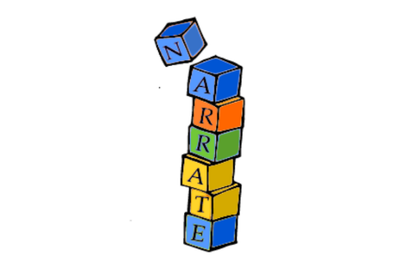
Unibo structure involved: Department of Psychology "Renzo Canestrari" - PSI
Scientific manager: Patrizia Selleri
Unibo Team: Elvis Mazzoni, Carlo Tomasetto, Maria Cristina Matteucci, Martina Benvenuti, Felice Carugati
Project Web page: https://www.narrate-project.eu
Erasmus+ Action type: Cooperation for innovation and the exchange of good practices Strategic Partnerships for school education
Project reference: 2020-1-SE01-KA201-077990
Start Date: 1 September 2020
End Date: 31 August 2023
Budget: Total: € 331,989 UNIBO: € 49,129
Coordinator
PITEA KOMMUN (SE)
Partners
ALMA MATER STUDIORUM - UNIVERSITÀ DI BOLOGNA (IT)
TALLINN MEELESPEA KINDERGARDEN (EE)
ELMER VZW (BE)
COMUNE DI IMOLA (IT)
SWEDEN EMILIA ROMAGNA NETWORK (IT)
Summary
Context/background:
In accordance with the scientific researches on the field (started by the pioneering work of J.Bruner), we consider the narrative approach in early education very important for promoting life skills, a resilience attitude and significant exploration of all the knowledge areas and every kind of social relations. The narrative approach starts from the assumption that each knowledge and skill can be easily learned if it is treated inside stories, both in written, oral or figurative ways. Despite this importance, the narrative approach in early education usually is limited to specific activities, supported by few and not very innovative methodologies, inside school-settings which are not arranged (from both a structural and organizational point of view), taking into account the regular adoption of the narrative approach in education every day. Further, although preschools could take great advantage from a continuous partnership with the local (public) libraries in this field, this almost never happens, since the collaboration between preschool and libraries at most is limited to single episodic experiences and/or the loan of books. The narrative approach is so important for improving the quality of early education that it is worth emphasizing the narrative approach till the adoption of a real narrative curriculum. Specific tools for planning and evaluation and the close involvement of new stakeholders (libraries) must support the adoption of the narrative approach.
Objectives:
General Objective: To foster quality in preschool education through increased attention to the narrative approach.
This general objective is articulated in the following specific objectives:
- SO1. Developing the narrative approach in preschools, adopting the appropriate tools to arrange the context, planning activities and evaluating the outcomes.
- SO2. Improving the collaboration between preschools and libraries for enhancing the narrative curriculum and for giving value and visibility to the spontaneous narrative production of the children (already present from an early age);
- SO3. Increasing preschool teachers’ professional skills on the narrative approach/curriculum.
The partnership is composed by:
A. Four preschools:
- Bergsvikens förskoleområde, Piteå Municipality – Sweden
- Early Childhood Educational Services, Imola Municipality – Italy (coordinator)
- Elmer schools in Schaarbeek (Brussels, Belgium)
- Meelespea Kindergarten in Tallinn – Estonia
B. The following specialized partners:
- University of Bologna – Italy – Department of Psychology
- SERN – Sweden Emilia Romagna Network – Public Agency
In addition, the project is supported by three public Libraries as co-partners: the ones from Stuttgart, Piteå and Imola Municipalities.
It is foreseen that the following practitioners will be involved in the project as a whole:
- 250 preschool teachers (40 involved in transnational activities).
- 7 preschool pedagogues (also involved in transnational activities)
- 10 academic experts (3 involved in transnational activities)
- 700 children attending preschools and their parents
- 10 librarians
Activities and Methodology:
- Gathering best practices on the project topics
- Realizing a comprehensive narrative approach in early education inside the involved preschools, editing a specific handbook as well.
- Carrying out specific activities for monitoring and evaluating the application of the narrative approach in early education;
- Realizing stable agreements between preschools and local libraries
- Providing two specific learning activities to the participants related to the objectives of the project.
On the base of these activities, to realize the following intellectual outputs:
- IO1: a handbook on the implementation of the narrative curriculum in preschools: guidelines on arranging the learning settings and the educational plan.
- IO2: a set of tools for monitoring evaluation both the appropriateness of the school setting and the children's learning well-being in the preschools adopting the narrative approach.
- IO3: at least 8 original childhood literature products starting from the children's spontaneous narrative creativity.
Results:
- At the end of the project the following results are expected:
- The adoption of the tested narrative curriculum by the involved preschools;
- The elaboration of some agreement framework between preschools and libraries
- The elaboration of tools for evaluating the real effectiveness of the adoption of the narrative approach in early education;
- Spreading the interest on the narrative curriculum in other schools managers in the territory of the partner.
Beyond the project:
- The intellectual outputs will be on a free disposal of all the preschools in the Europe also after the end of the project;
- UNIBO will be able to carry out the academic research on the topics of the project, even beyond its end;
- The involved preschools will keep in touch to further develop the project's topic.
